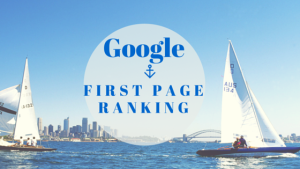
Leads may come in handy for a business that is struggling to make sales.
When a sales manager is confused about what to do next, free Internet leads can reduce a company’s bottom line.
Small business owners can learn about low-cost methods to get found online and to obtain free Internet leads.
How to Get a First Page Ranking on Google and Bing?
Small business owners occasionally fantasize about obtaining a first page ranking on Google.
For so many entrepreneurs, it’s just a dream.
Getting a website to rank within the top 10 natural search engine rankings could be a life changing experience for a small business owner.
Imagine the amount of leads that a small business website could receive with a top ranking on the first page of Google.
It is important to know that it is possible for a local business to obtain a first page ranking on Google and Bing.
Some Internet marketing firms claim to instantly get a website ranked on the first page of the major search engines.
May be it could happen once or twice.
However, our experience has shown that it takes a lot of content, hard work and consistency to get found online.
With thousands of first page search engine rankings, we can show you how to appear at the top of the Google search engine results, too.
Use This Format to Get a Google First Page Ranking
Step 1. Develop a Content Strategy
Step 2. Conduct Research
Step 3. Keyword Research
Step 4. Create Appropriate Web Title Pages
Step 5. Create Stellar Headlines
Step 6. Craft Engaging Content
Step 7. Focus on Relevancy
Step 8. Register for Online Business Directories
Step 9. Use at Least Two Social Media Platforms to Network and Share Information
Step 11. Apply Meta Descriptions to Website Articles and Blog Posts
Let’s Review These 11 Steps:
Develop a Content Strategy
Instead of publishing and sharing random materials, a small business owner should create a plan for specific types of content.
Conduct Research
Research is essential to writing great content.
Even highly experienced professionals should perform research that coincides with certain opinions and common knowledge.
Research should be performed to obtain statistics, facts, references and keyword data.
Keyword Research
Keyword research is a primary component to a first page ranking on the search engines.
Avoid the mistake of guessing which keywords to use.
Search engine optimization experts use keyword research to form a content strategy.
Small business owners should also initiate some keyword research or hire an SEO copywriter for assistance.
Create Appropriate Web Title Pages
A small business website will need to display web title pages that visitors and search engines can easily identify.
For instance, a small business might have a three-page website that features an “Index” page, an “About Us” page and a “Services” page.
Create Stellar Headlines
Amazing article titles and blog titles will be needed to capture the attention of web-based users.
A stellar headline could entice a reader to learn more about a specific article versus searching for other information.
Craft Engaging Content
Few people will consistently read useless information.
However, if a web-based visitor finds value within an article or a blog, she might read a larger portion of the content versus skimming the page to find something that is meaningful.
Additionally, a reader could share the article or the blog with thousands of her social media followers.
Focus on Relevancy
Maintaining relevant content across all mediums will help readers identify with a brand and the company’s messages.
Alternative content usually confuses readers.
Consistent messaging that stays on topic is the best way to showcase relevant information.
Register for Online Business Directories
Submitting a company’s information to online business directories could increase a website’s visibility to search engines.
Local online business directories typically ask for information, such as a company’s name, address, owner’s name, website address, types of services provided, years in business and other details.
To get found online, a business must maintain accurate information with online business directories.
Use at Least Two Social Media Platforms to Network and Share Information
At an increasing rate, search engines are observing social signals that a company or a website receives online.
While social media participation varies among a user’s preference, Facebook, Twitter, LinkedIn, Instagram, Snapchat, TikTok, Tumblr and Pinterest are among the most popular platforms.
Maintain a Mobile Website
Every small business should have a responsive website.
Search engines will penalize websites and blogs that are not adequate for mobile and desktop usage.
A mobile website will format its content to fit a variety of screen sizes.
Whether a web-based user lands on a company’s web page via a smartphone, laptop or a tablet, a mobile website will automatically resize the content that would ordinary appear on a desktop computer.
Apply Meta Descriptions to Website Articles and Blog Posts
Meta descriptions are snippets that search engines use to highlight the content that’s shown on a web page.
Correctly applying meta descriptions and title tags are helpful toward page ranking and to get found online.
Get Found Online to Receive Free Internet Leads
With a first page search engine ranking, a small business website will be visible to web-based users.
The name of the game is to get found online within the top search engine results.
On a typical search engine results page, a few paid advertisements are displayed at the top and the bottom portions of the page.
Natural search engine results are shown just below the upper page ads.
Natural results are also known as organic search engine results.
While display advertisers pay for clicks on a per action basis, websites that appear within the organic search results will not incur pay-per-click costs.
Therefore, a small business owner should incorporate the 11 steps shown above to obtain free Internet leads.
Otherwise, Google may be contacted to buy display advertisements or pay-per-click leads.
For many small business owners, search engine marketing costs are too expensive.
Dozens of pay-per-click actions might occur before a company receives a sale.
However, search engine marketing and social media marketing are most successful when testing and calculations for the ideal sales conversions are proven to generate a profit.
A small business owner might find that pay-per-click leads from Google are outside of his marketing budget and that a limited amount of time will be available to maintain the above steps to secure a first page ranking online.
Mobile Copywriter may be contacted about SEO services and SEO copywriting to get found online and for free Internet leads.
Get Info


